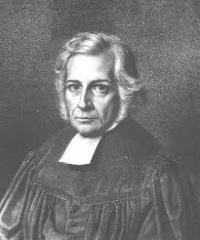Schleiermacher
From Geography
HansKlerks (Talk | contribs) (Created page with "Friedrich Schleiermacher is known as the father of modern theology and also as the father of modern hermeneutics. He transformed the hermeneutics from Biblical hermeneutics to ge...") |
KoenMolenaar (Talk | contribs) |
||
| (2 intermediate revisions not shown) | |||
| Line 1: | Line 1: | ||
| - | Friedrich Schleiermacher | + | [[File:FriedrichSchleiermacher.jpg|200px|thumb|right|FriedrichSchleiermacher]] |
| + | |||
| + | Friedrich Schleiermacher (1768-1834) was a German philosopher known as the father of modern theology and also as the father of modern hermeneutics. He transformed the hermeneutics from Biblical hermeneutics to general hermeneutics which includes all kinds of texts. Texts refer not only to written text but also to conversation and understanding. Schleiermacher recognizes two aspects of interpretation: grammatical and psychological. | ||
In the grammatical interpretation it is important to understand the text. Therefore you have to understand words to understand sentences, sentences to understand paragraphs and further to understand the whole text. This made a circle because you have to understand the whole text to understand individual sentences and you have to understand individual sentences to understand the whole text. This is what Schleiermacher calls the ‘hermeneutical circle’. | In the grammatical interpretation it is important to understand the text. Therefore you have to understand words to understand sentences, sentences to understand paragraphs and further to understand the whole text. This made a circle because you have to understand the whole text to understand individual sentences and you have to understand individual sentences to understand the whole text. This is what Schleiermacher calls the ‘hermeneutical circle’. | ||
This hermeneutical method is a back-and-forth movement of information and when there is more information exchanged the understanding will be better. | This hermeneutical method is a back-and-forth movement of information and when there is more information exchanged the understanding will be better. | ||
| + | ==References== | ||
Rutt, J. ''On Hermeneutics''. Vinddatum 24-10-2012 op: http://nb.vse.cz/kfil/elogos/student/rutt.pdf | Rutt, J. ''On Hermeneutics''. Vinddatum 24-10-2012 op: http://nb.vse.cz/kfil/elogos/student/rutt.pdf | ||
| + | |||
| + | ==Contributors== | ||
| + | *''Page enhanced by KoenMolenaar 26-10-2012'' | ||
Latest revision as of 11:21, 26 October 2012
Friedrich Schleiermacher (1768-1834) was a German philosopher known as the father of modern theology and also as the father of modern hermeneutics. He transformed the hermeneutics from Biblical hermeneutics to general hermeneutics which includes all kinds of texts. Texts refer not only to written text but also to conversation and understanding. Schleiermacher recognizes two aspects of interpretation: grammatical and psychological.
In the grammatical interpretation it is important to understand the text. Therefore you have to understand words to understand sentences, sentences to understand paragraphs and further to understand the whole text. This made a circle because you have to understand the whole text to understand individual sentences and you have to understand individual sentences to understand the whole text. This is what Schleiermacher calls the ‘hermeneutical circle’. This hermeneutical method is a back-and-forth movement of information and when there is more information exchanged the understanding will be better.
References
Rutt, J. On Hermeneutics. Vinddatum 24-10-2012 op: http://nb.vse.cz/kfil/elogos/student/rutt.pdf
Contributors
- Page enhanced by KoenMolenaar 26-10-2012
